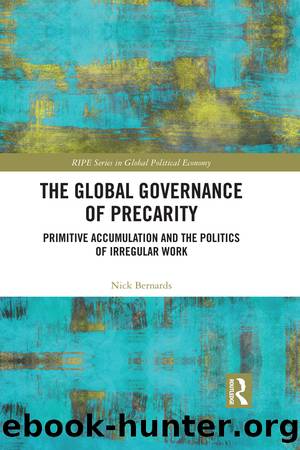The Global Governance of Precarity: Primitive Accumulation and the Politics of Irregular Work by Nick Bernards

Author:Nick Bernards [Bernards, Nick]
Language: eng
Format: epub
Tags: Political Science, General
ISBN: 9781351398541
Google: m39KDwAAQBAJ
Goodreads: 38505572
Publisher: Routledge
Published: 2018-02-05T00:00:00+00:00
WEP and the âdiscoveryâ of employment
WEP was probably the ILOâs defining programme in the late 1960s and early 1970s. The project was started with a considerable degree of fanfare in 1968, as one of David Morseâs final acts as Director General before retirement (the Pope even attended the ceremony to launch the programme). The program would contribute to several major ideational developments in the governance of poverty in the 1970s â not only the concept of the âinformalâ, but also âbasic needsâ and âredistribution from growthâ which were highly influential at the time (see Saith 2005; Bangasser 2000).
Many insider histories produced by the ILO and former officials locate the genesis of WEP in the âdiscoveryâ that without widespread employment, economic growth did not necessarily lead to âdevelopmentâ in the sense of greater human wellbeing (see Saith 2005: 1168). In contrast to conventional approaches to development at the time, emphasizing economic growth and capital formation, the ILO sought to place âemployment generation into the center of the national planning and development efforts as an explicit policy objective in its own right, instead of leaving it as a residual and eventual consequence of âsuccessfulâ development effortsâ (Bangasser 2000: 5). Importantly, employment was seen in this context as a means to increasing human wellbeing rather than an end in itself. In explaining the purpose of the WEP, outgoing Director General Morse would argue that:
Productive employment by itself is very much an economic concept. But it leads⦠to a wider sharing of the fruits of development⦠Where poverty is widespread, these elementary gains are the first and almost the only meaning of social progress.
(1968: 519â520)
Download
This site does not store any files on its server. We only index and link to content provided by other sites. Please contact the content providers to delete copyright contents if any and email us, we'll remove relevant links or contents immediately.
| Historic | Information Systems |
| Regional |
Man-made Catastrophes and Risk Information Concealment by Dmitry Chernov & Didier Sornette(6005)
The Revenge of Geography: What the Map Tells Us About Coming Conflicts and the Battle Against Fate by Kaplan Robert D(4066)
Zero Waste Home by Bea Johnson(3833)
COSMOS by Carl Sagan(3617)
Good by S. Walden(3548)
In a Sunburned Country by Bill Bryson(3536)
The Fate of Rome: Climate, Disease, and the End of an Empire (The Princeton History of the Ancient World) by Kyle Harper(3055)
A Wilder Time by William E. Glassley(2858)
Camino Island by John Grisham(2794)
Organic Mushroom Farming and Mycoremediation by Tradd Cotter(2688)
The Ogre by Doug Scott(2679)
Human Dynamics Research in Smart and Connected Communities by Shih-Lung Shaw & Daniel Sui(2500)
Energy Myths and Realities by Vaclav Smil(2487)
The Traveler's Gift by Andy Andrews(2457)
9781803241661-PYTHON FOR ARCGIS PRO by Unknown(2365)
Inside the Middle East by Avi Melamed(2350)
Birds of New Guinea by Pratt Thane K.; Beehler Bruce M.; Anderton John C(2249)
A History of Warfare by John Keegan(2240)
And the Band Played On by Randy Shilts(2197)
